Table of Contents
Claude Debussy: The 100 most inspiring musicians of all time
The works of French composer Claude Debussy (Achilles-Claude Debussy) (b. Aug. 22, 1862, Saint-German-en-Laye, France —d. March 25, 1918, Paris) have been a seminal force in the music of the 20th century. Debussy developed a highly original system of harmony and musical structure that expressed in many respects the ideals to which the impressionist and symbolism painters and writers of his time aspired.
Early Period
Debussy showed a gift as a pianist by the age of nine. He was encouraged by Madame Mauté de Fleurville, who was associated with the Polish composer Frédéric Chopin, and in 1873 he entered the Paris Conservatory, where he studied the piano and composition, eventually winning in 1884 the Grand Prix de Rome with his cantata L’Enfant prodigue (The Prodigal Child ).
While living with his parents in a poverty-stricken suburb of Paris, he unexpectedly came under the patronage of a Russian millionairess, Nadezhda Filaretovna von Meck, who engaged him to play duets with her and her children. He traveled with her to her palatial residences throughout Europe during the long summer vacations at the Conservatory. In Paris during this time he fell in love with a singer, Blanche Vasnier, the beautiful young wife of an architect; she inspired many of his early works.

This early style is well illustrated in one of Debussy’s best-known compositions, Clair de Lune. The title refers to a folk song that was the conventional accompaniment of scenes of the love-sick Pierrot in the French pantomime; and indeed the many Pierrot-like associations in Debussy’s later music, notably in the orchestral work Images (1912) and the Sonata for Cello and Piano (1915; originally titled Pierrot fâché avec la lune [“Pierrot Vexed by the Moon”]), show his connections with the circus spirit that also appeared in works by other composers.
Claude Debussy’s Sheet Music download.
Middle Period
As a holder of the Grand Prix de Rome, Debussy was given a three-year stay at the Villa Medici, in Rome, where, under what were supposed to be ideal conditions, he was to pursue his creative work. Debussy eventually fled from the Villa Medici after two years and returned to Blanche Vasnier in Paris. At this time Debussy lived a life of extreme indulgence. Once one of his mistresses, Gabrielle (“Gaby”) Dupont, threatened suicide. His first wife, Rosalie (“Lily”) Texier, a dressmaker, whom he married in 1899, did in fact shoot herself, though not fatally, and, Debussy himself was haunted by thoughts of suicide.
The main musical influences on Debussy were the works of Richard Wagner and the Russian composers Aleksandr Borodin and Modest Mussorgsky. Wagner fulfi lled the sensuous ambitions not only of composers but also of the symbolist poets and the impressionist painters.
Wagner’s conception of Gesamtkunstwerk (“total art work”) encouraged artists to refi ne upon their emotional responses and to exteriorize their hidden dream states, often in a shadowy, incomplete form; hence the more tenuous nature of the work of Wagner’s French disciples.
It was in this spirit that Debussy wrote the symphonic poem Prélude à l’après-midi d’un faune (1894). Other early works by Debussy show his affinity with the English Pre-Raphaelite painters; the most notable of these works is La Damoiselle élue (1888), based on The Blessed Damozel (1850), a poem by the English poet and painter Dante Gabriel Rossetti.
In the course of his career, however, which covered only 25 years, Debussy was constantly breaking new ground. His single completed opera Pelléas et Mélisande (first performed in 1902) demonstrates how the Wagnerian technique could be adapted to portray subjects like the dreamy nightmarish figures of this opera who were doomed to self-destruction.
Debussy and his librettist, Maurice Maeterlinck, declared that they were haunted in this work by the terrifying nightmare tale of Edgar Allan Poe, The Fall of the House of Usher. The style of Pelléas was to be replaced by a bolder, more highly coloured manner. In his seascape La Mer (1905) he was inspired by the ideas of the English painter J. M.W. Turner and the French painter Claude Monet. In his work, as in his personal life, he was eager to gather experience from every region that the imaginative mind could explore.
Late Period
In 1905 Debussy’s illegitimate daughter, Claude-Emma, was born. He had divorced Lily Texier in 1904 and subsequently married his daughter’s mother, Emma Bardac. For his daughter he wrote the piano suite Children’s Corner (1908).
Debussy’s spontaneity and the sensitive nature of his perception facilitated his acute insight into the child mind, an insight noticeable particularly in Children’s Corner; in the Douze Préludes, two books (1910, 1913; “Twelve Preludes”), for piano; and in the ballet La Boîte à joujoux (1st perf. 1919;
The Box of Toys). In his later years, it is the pursuit of illusion that marks Debussy’s instrumental writing, especially the strange, otherworldly Cello Sonata. This noble bass instrument takes on, in chameleon fashion, the character of a violin, a flute, and even a mandolin.
Evolution of His Work
Debussy’s music marks the first of a series of attacks on the traditional language of the 19th century. He did not believe in the stereotyped harmonic procedures of the 19th century, and indeed it becomes clear from a study of mid-20th-century music that the earlier harmonic methods were being followed in an arbitrary, academic manner.
Debussy’s inquiring mind similarly challenged the traditional orchestral usage of instruments. He rejected the traditional dictum that string instruments should be predominantly lyrical. The pizzicato scherzo from his String Quartet (1893) and the symbolic writing for the violins in La Mer, conveying the rising storm waves, show a new conception of string colour. Similarly, he saw that woodwinds need not be employed for fireworks displays; they provide, like the human voice, wide varieties of colour.
Debussy also used the brass in original colour transformations. In fact, in his music, the conventional orchestral construction, with its rigid woodwind, brass, and string departments, finds itself undermined or split up in the manner of the Impressionist painters. Ultimately, each instrument
becomes almost a soloist, as in a vast chamber-music ensemble. Finally, Debussy applied an exploratory approach to the piano, the evocative instrument par excellence.
In his last works, the piano pieces En blanc et noir (1915; In Black and White) and in the Douze Études (1915; “Twelve Études”), Debussy had branched out into modes of composition later to be developed in the styles of Stravinsky and the Hungarian composer Béla Bartók. It is certain that he would have taken part in the leading movements in composition of the years following World War I. His life, however, was tragically cut short by cancer.
The Best of Debussy
Pianist: Pascal Rogé
Track List:
Arabesque Nº1 4:21 Arabesque Nº2 7:49 Clair De Lune 13:29 Passepied 16:46 Rêverie 21:40 Hommage A Rameau 29:22 Voiles 33:41 Les Sons Et Les Parfums Tournent Dans L’air Du Soir 37:58 La Fille Aux Cheveux De Lin 41:02 La Cathédral Engloutie 48:10 Musiciens 50:35 Le Petit Berger 54:05 Golliwogg’s Cakewalk 57:13 L’isle Joyeuse 1:03:35 Prelúdio para a tarde de um fauno
Browse in the Library:
| Artist or Composer / Score name | Cover | List of Contents |
|---|---|---|
| Barber – Agnus Dei Op. 11 (full score transcribed for mixed Chorus with Organ or Piano Accompaniment) |
 |
|
| Barber – Samuel Barber The Composer And His Music (1992) by Barbara B. Heyman (Biography) |
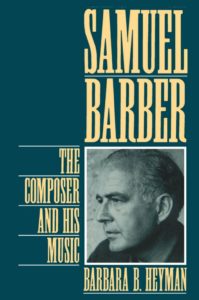 |
|
| Barber Violin Concerto (Violin and Piano sheet music) |
 |
|
| Barber Violin Concerto (Violin part sheet music) |
 |
|
| Barber_Violin_Concerto.mscz.mscz | ||
| Barber, Samuel Cello Concerto (Cello Part) |
 |
|
| Barber, Samuel Sonata For Piano, Op.26 |
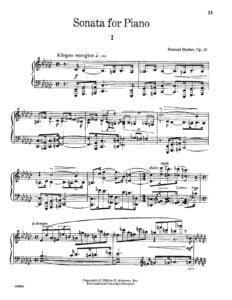 |
|
| Barber, Samuel – Sure On This Shining Night for Piano and SATB |
 |
|
| Barber, Samuel – Adagio for Strings Op. 11 Agnus Dei (solo piano arr.) |
 |
|
| Barber, Samuel – Four Songs – Nocturne |
 |
|
| Barber, Samuel – Four Songs – A Nun takes the Veil |
 |
|
| Barber, Samuel – Four Songs The Secrets of the Old |
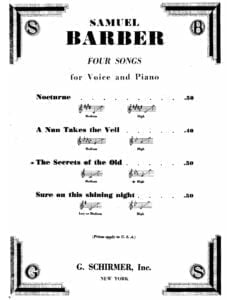 |
|
| Barber, Samuel – Summer Music |
 |
|
| Barber, Samuel Adagio for Strings full score | Samuel Barber-Adagio for Strings full score | |
| Barber, Samuel Adagio For Strings Samuel Barber (Musescore File).mscz | ||
| Barber, Samuel Agnus Dei Adagio for strings op. 11 for mixed chorus |
 |
|
| Barber, Samuel Nocturne Op. 33 |
 |
|
| Barber, Samuel Op 26 Piano Sonata |
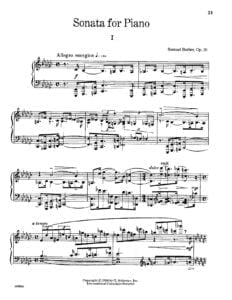 |
|
| Barbra Streisand The way we were (piano) | Barbra Streisand The way we were piano | |
| Barbra Streisand – Not While Im Around |
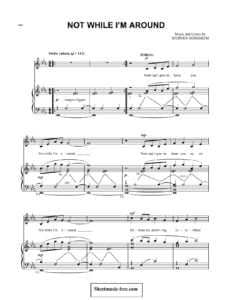 |
|
| Barbra Streisand – Evergreen | ||
| Barbra Streisand – Send In The Clowns | ||
| Barbra Streisand – The Broadway album (Piano and voice) |
 |
Streisand, Barbra – The Broadway album (Piano and voice) |
| Barbra Streisand – The Way We Were | ||
| Barbra Streisand Collection |
 |
Book Barbra Streisand Collection |
| Barbra Streisand Evergreen | Barbra Streisand Evergreen | |
| Barbra Streisand Guilty – songbook |
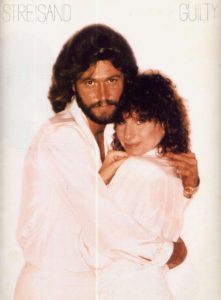 |
Barbra Streisand Guilty – songbook |
| Barbra Streisand Memories Songbook |
 |
Barbra Streisand Memories Songbook |
| Barbra Streisand My Name Is Barbra (Barbra Streisand) (Book) |
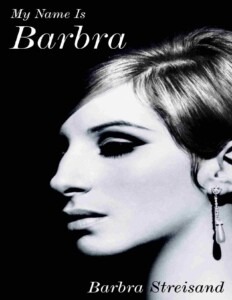 |
|
| Barbra Streisand Somewhere From West Side Story | Barbra Streisand Somewhere From West Side Story | |
| Barcarolle (Musescore File).mscz | ||
| Barney Kessel – The Jazz Guitar Artistry Of Barney Kessel (14 original Guitar Solos) |
 |
Barney Kessel – The Jazz Guitar Artistry Of Barney Kessel (14 original Guitar Solos) |
| Barney Kessel – The Jazz Guitar Artistry Of Barney Kessel (Vol. 2 original Guitar Solos) |
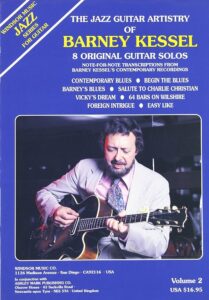 |
Barney Kessel – The Jazz Guitar Artistry Of Barney Kessel (Vol. 2 original Guitar Solos) |
| Barney Kessel Danny Boy Guitar with Tablature |
 |
|
| Barney Kessel Minor Mode |
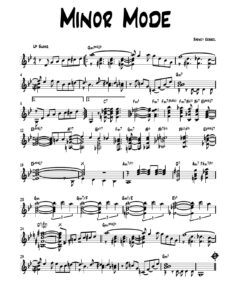 |
|
| Baroque Expressions Martha Mier from Bravo Book One (Piano Solos).mscz | ||
| Baroque Guitar Sheet Music arr. by Frederick Noad Guitar Anthology,The Classical Guitar |
 |
Baroque Guitar Sheet Music arr. by Frederick Noad Guitar Anthology,The Classical Guitar |
| Baroque Keyboard Anthology Book 1 24 Works For Piano Or Keyboard by Robin Bigwood |
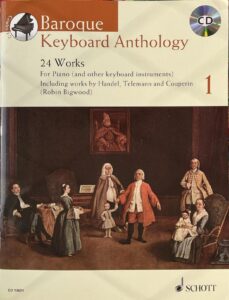 |
Baroque Keyboard Anthology Book 1 24 Works For Piano Or Keyboard by Robin Bigwood |
| Barrelhouse And Boogie Piano by Eric Kriss |
 |
Barrelhouse And Boogie Piano by Eric Kriss |
| Barry Hanks – Rhythm Changes Solo Transcription | Barry Hanks – Rhythm Changes Solo Transcription | |
| Barry Harris Approach to improvised lines & harmony |
 |
|
| Barry Harris Basics Summary Of Class Exploring the Diminished |
 |
|
| Barry Harris Donna Lee sheet music transcription |
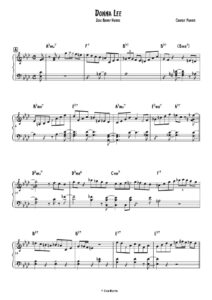 |
|
| Barry Harris Harmonic Method For Guitar, The |
 |
|
| Barry Harris Jazz Workshop Part 1 |
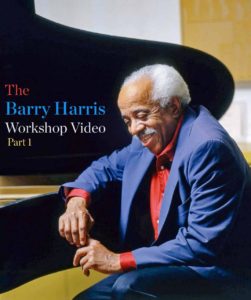 |
|
| Barry Harris Jazz Workshop Part 2 |
 |
|
| Barry Harris Method Método IMPROVISACIÓN (Español-Spanish) |
 |
|
| Barry Harris On Green Dolphin Street sheet music transcription |
 |
|
| Barry Harris’ solo on “Woody n’You | Barry Harris Woody n’You | |
| Barry Manilow – Can’t Smile Without You |
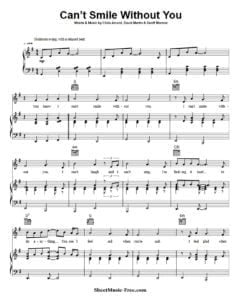 |
|
| Barry Manilow – Copacabana (At the Copa) |
 |
|
| Barry Manilow – Copacabana | ||
| Barry Manilow – Mandy | ||
| Barry Manilow – Sheet Music Anthology |
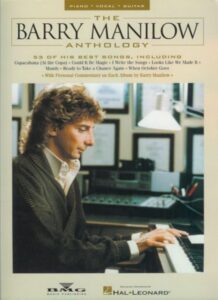 |
Barry Manilow – Sheet Music Anthology |
| BARRY WHITE – (THE COLLECTION) |
 (88) (PF)-212x300.jpg) |
BARRY WHITE – (THE COLLECTION) |
| Barry White – Loves Theme | ||
| Bart Howard – Fly Me To The Moon Guitar and TABs (Jazz Standard) | Bart Howard – Fly Me To The Moon Guitar and TABs (Jazz Standard) | |
| Bartok – For Children, Sz. 42 Complete 1 to 43 Bela Bartok |
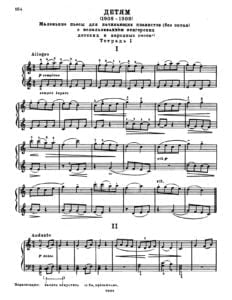 |
|
| Bartok – Improvisations op 20 Bela Bartok |
 |
|
| Bartok – Mikrokosmos (Books 1 to 6) Bela Bartok | Bartok – Mikrokosmos (1-6) sheet music |
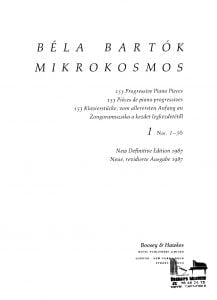 |
| Bartok – Mikrokosmos Vol. 2 Bela Bartok |
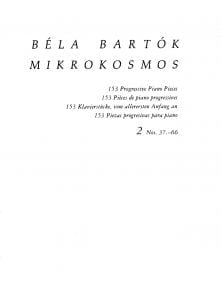 |
|
| Bartok – Mikrokosmos Vol. 4 Bela Bartok |
 |
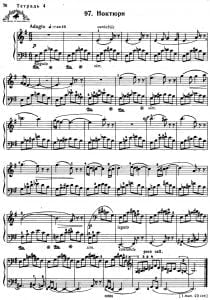 |
| Bartok – Mikrokosmos Vol.1 Bela Bartok |
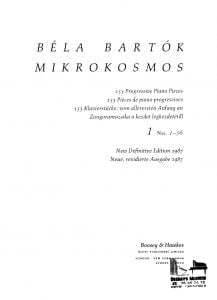 |
|
| Bartok – Sonate For Piano Solo Bela Bartok |
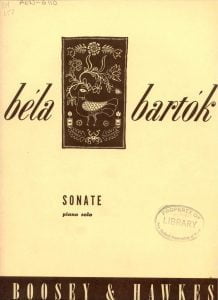 |
|
| Bartok 6 Danses populaires roumaines Bela Bartok | Bartok.-.6.Danses.populaires.roumaines | |
| Bartok For Children Book 1 Based On Hungarian Folk Tunes Piano Solo |
 |
|
| Bartok For Children Book 2 after Slovakian Folk Tunes Piano Solo | Bartok For Children Book 2 after Slovakian Folk Tunes Piano Solo | |
| Bartok Improvisations op. 20 Bela Bartok |
 |
|
| Bartok Piano Sonata Bela Bartok |
 |
|
| Bartok Ten Easy Pieces |
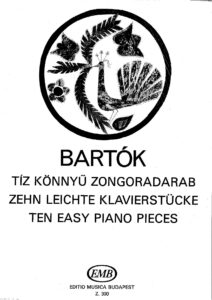 |
|
| Basic Piano Library Piano Recital Book Level 1B |
 |
Basic Piano Library Piano Recital Book Level 1B |
| Bass Guitar For Dummies (eBook) |
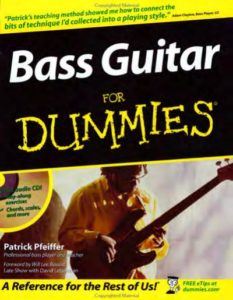 |
|
| Bass Standards (Classic Jazz Masters) Note for note transcriptions of jazz Bass classic performances |
 |
Bass Standards (Classic Jazz Masters) Note for note transcriptions of jazz Bass classic performances |
| Bastien – Piano Basics Level 1 Piano |
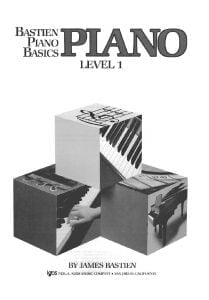 |
|
| Bastien Piano Basics – Piano for the Young Beginner Primer A |
 |
|
| Bastien Piano Basics – Piano for the Young Beginner Primer B |
 |
|
| Bastien Piano Basics – Theory Level 2 | Bastien Piano Basics – Theory Level 2 | |
| Bastien Piano Basics Level 3 |
 |
|
| Bastien Piano Basics Technic Primer Level for children |
 |
|
| Batman – Flowers Of The Past – Danny Elfman | Batman-Flowers-Of-The-Past-Danny-Elfman 1st page | |
| Batman – Sonata In Darkness Michael Giacchino | Batman – Sonata In Darkness Michael Giacchino | |
| Batman Begins – Hans Zimmer James Newton Howard Ramin Djawadi – Molossus |
 |
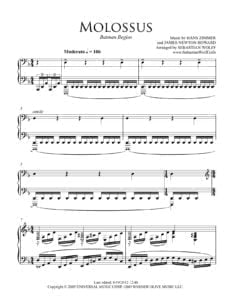 |
| Batman Returns – Birth Of A Penguin – Danny Elfman | Batman Returns – Birth Of A Penguin – Danny Elfman | |
| Battlefield 1 – Homing Pigeon | Battlefield 1 – Homing Pigeon | |
| Baywatch – Main Theme | ||
| Be My Love (Nicholas Brodszky & Sammy Cahn) Jazz Piano Solo arr. sheet music |
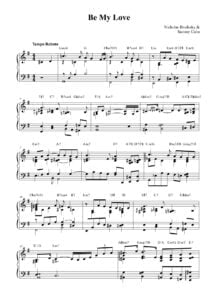 |
|
| Beach Boys Good Vibrations sheet music |
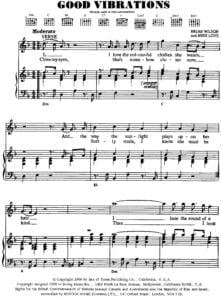 |
|
| Beach Boys The Best Of Book |
 |
 |
| Beach Boys, The – Guitar Anthology Series |
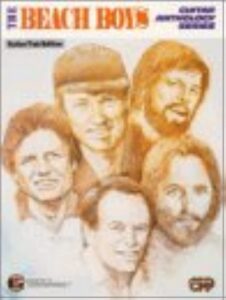 |
Beach Boys, The – Guitar Anthology Series |
| Beato Book 4.0, The – A Creative Approach to Music Theory and Improvisation for Guitar and Other Instruments |
 |
|
| Beautiful (Christina Aguilera) | ||
| Beautiful rain Soredemo Sekay | Beautiful rain Soredemo Sekay | |
| Beauty And The Beast – Alan Menken from 1991 Disney film Piano Solo |
 |
|
| Beauty And The Beast – Main Theme – Alan Menken | ||
| Beauty And The Beast (Disney) Piano Score |
 |
Beauty And The Beast (Disney) Piano Score |
| Bebo Valdes – El Manisero – Piano solo | El Manisero – Bebo Valdes | |
| BEBOP – The Music and its Players (Thomas Owens) Book |
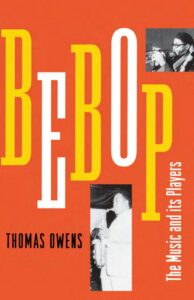 |
|
| Bebop Exercise.mscz | ||
| BeBop Jazz Piano – John Valerio – Book + MP3 audio tracks |
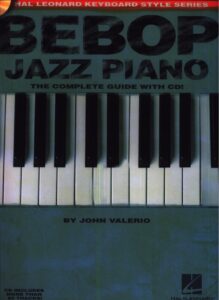 |
Bebop piano sheet music book |
| Bebop Piano Legends Artist Transciptions For Piano |
 |
Bebop Piano Legends Artist Transciptions For Piano |
| Bebop Third Ear The Essential Listening Companion (Scott Yanow) Book |
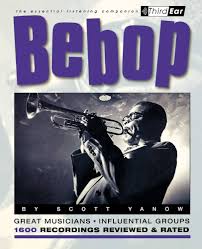 |
|
| Because – The Beatles (For String Quartet) (Musescore File).mscz | ||
| Beck – Everybodys gotta learn sometime – with lyrics |
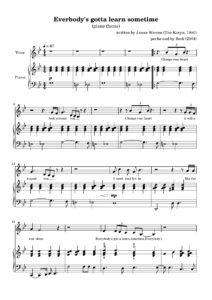 |
|
| Bee Gees It’s Easy To Play Bee Gees |
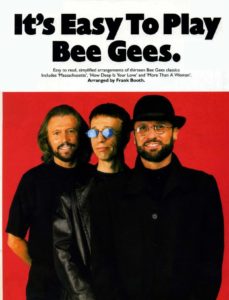 |
Bee Gees It’s Easy To Play Bee Gees |
| Bee Gees – How Deep Is Your Love |
 |
|
| Bee Gees – Stayin Alive | ||
| Bee Gees Anthology – complete songbook |
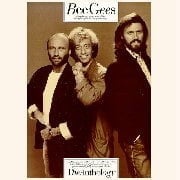 |
The Bee Gees Guitar Songbook |
| Beegie Adair Fly Me To The Moon Jazz Standard Piano Solo |
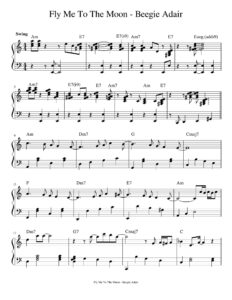 |
|
| Beegie Adair It Never Entered My Mind (Jazz Standard Transcription) |
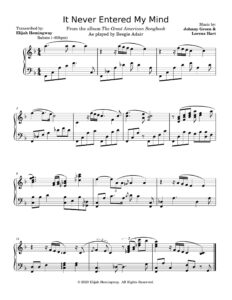 |
|
| Beethoven Ode To Joy (Jazz Version) |
 |
|
| Beethoven Piano Concerto No. 4 1st Movement Arr. For 2 Pianos |
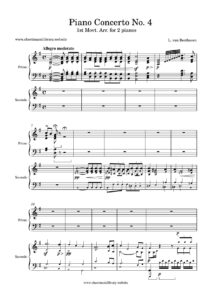 |
|
| Beethoven Piano Concerto No. 4 3rd Movement Arr. For 2 Pianos |
 |
|
| Beethoven Variations In E Flat Major Eroica Op. 35 Piano Solo arr. |
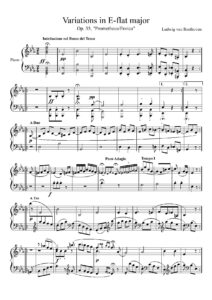 |
|
| Beethoven L.V. – Piano Sonata 15 |
 |
|
| Beethoven Piano Concerto No. 5 In E-Flat Major Emperor Op. 73 – Piano Solo (Musescore File).mscz | ||
| Beethoven – 6 Sonatinas |
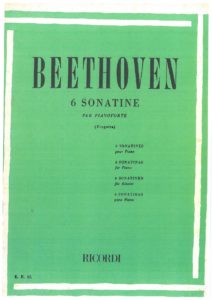 |
|
| Beethoven – A First Book of Beethoven Easy Piano arr. favorite pieces by David Dutkanicz |
 |
Beethoven – A First Book of Beethoven Easy Piano arr. favorite pieces by David Dutkanicz |
| Beethoven – Choral Fantasy For Piano Choir And Orchestra Op. 80 (Musescore File).mscz | ||
| Beethoven – Fantasia In G Minor. Op.77 (Musescore File).mscz | ||
| Beethoven – Fur Elise | Beethoven – Fur Elise |
